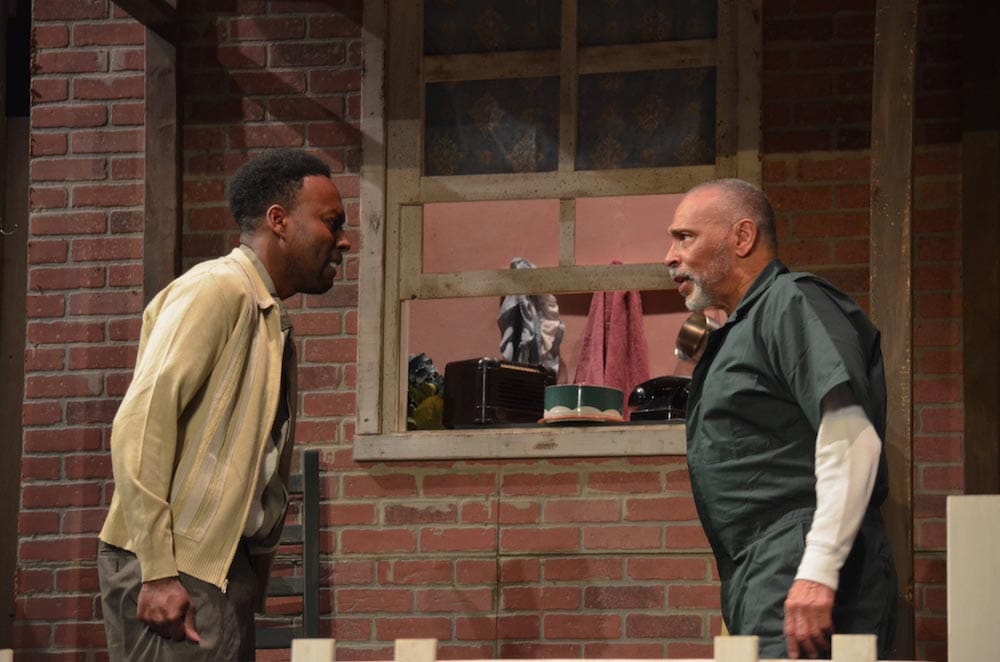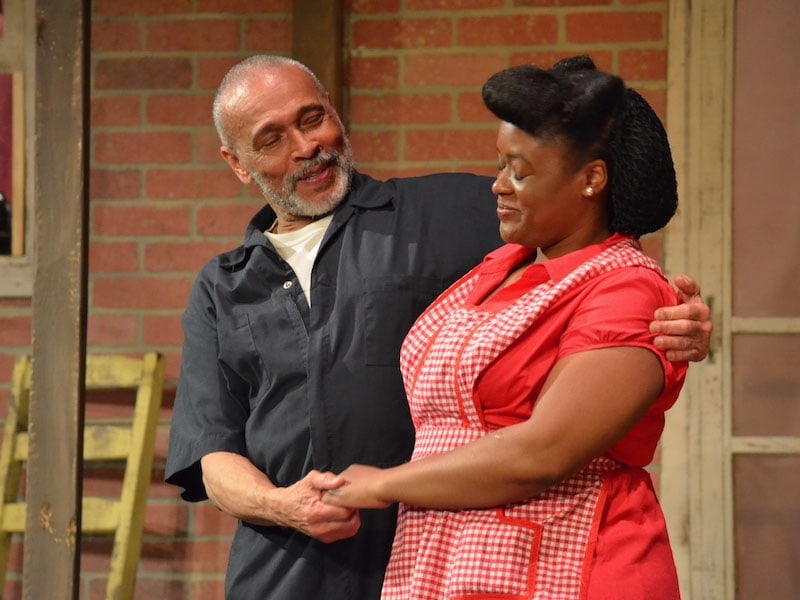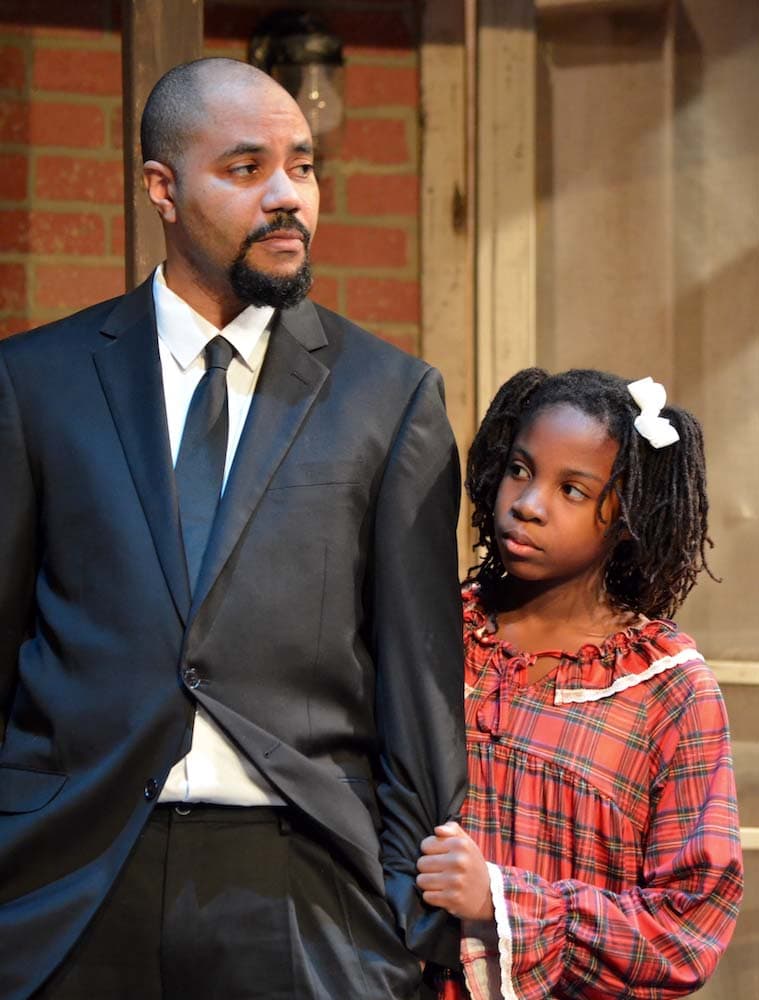Is there such a thing as generational curses? Does Black Excellence supersede racism? Can we visit the sins of the father on the child? These questions lingered in my mind as I watched Bowie Community Theatre’s well-done performance of Fences. It’s a show that will make you feel and question deeply.
Fences by August Wilson has had a long-acclaimed theatrical run. First produced on Broadway in 1987, the play won Tonys for Best Play, Best Actor, and Best Actress, and the Pulitzer Prize for Drama. In 2016 it was adapted into a film starring two Academy Award winners, Denzel Washington and Viola Davis. Wilson, America’s Shakespeare by any measure, demands your full attention as an audience member, as a director, as an actor, and even as a critic.
Fences takes place in Pittsburgh, Pennsylvania, during the late-1950s and focuses on Troy Maxson, a disgruntled ex–Negro Leagues baseball player who works as a sanitation worker. At one point considered to be one of the best baseball players in the Negro Leagues (once batting .437 and 37 home runs), Troy can no longer play professionally because of his age, 53, and a past stint in prison, leaving him feeling bitter toward life and people around him.

Thirty-year veteran actor Louis B. Murray, who has appeared in several other of Wilson’s plays, embodied Troy in a manner that transcended Wilson’s fiction. Murray’s every monologue and line of dialogue was complex and full of meaning, portraying Troy as a real person.
One of the stronger themes in the show was father-and-son rivalry. There was much tension between Troy’s son Cory because Cory wanted to play college football. Like many parents, Troy wanted his son to go into something stable like a trade and not try to make it in something far-flung like professional sports or, God forbid, the arts (as his other son, Lyons, a jazz musician did). Part of the reason Troy was skeptical of professional sports as an avenue to help uplift the Black man was his view that Black Excellence wouldn’t be rewarded there: “I know 100 [n-words] that can play baseball better than Jackie Robinson.”
Denzell Massenburg’s Cory brought an effective amount of tension in his scenes with Murray. Their simple parent/child argument over buying a TV or fixing the roof was an example of the chemistry between those actors.

Troy and his wife Rose’s relationship is complex and deep. Troy “love[s] her so much it hurts.” But that didn’t prevent Troy from doing something to Rose that changed his family dynamic forever. JoAn Monplaisir was fantastic in the scenes in which Rose implored Tory to let Cory pursue his athletic dreams.
Shawn Armwood Sr. played Troy’s mentally challenged war-veteran brother, Gabriel, with pain and subtly. Always carrying around a trumpet, the character alluded to the Biblical archangel Gabriel.
Troy’s friend and sanitation co-worker, Bono, was a simple man who liked to go home to his wife and eat pig feet. Tillmon Figgs played Bono as a jovial counselor and conscience-bearer for Troy. It was Bono who alluded to the metaphor of Troy’s half-built fence: “Some people build fences to keep people out…and other people build fences to keep people in.”

Child actor Ava Brown made an adorable acting debut as Raynell Maxson. Ryan Willis, in his first performance at the Bowie Playhouse, was on point as Troy’s musician son, Lyons. His every scene was crisp and engaging. (Because of Willis’s pending foot surgery, after opening weekend, Lyons will be played by Mack Leamon, who has done amazing work in local productions of Stick Fly and Radio Golf).

With its faux brick wall, laundry line, and fence-in-progress, Daniel Lavanga’s set made 1950s Pittsburgh real to me — I loved it. Mary Wakefield’s costume design was most impressive in the Marine uniform she put Massenburg in.
This show is a study in perseverance. Rehearsals for the show were shut down at the official start of the pandemic, and it took two years for it to be brought to the stage; the original director, Frank B. Moorman, suffered a series of health issues. He was replaced by Nicole Mullins, who brought an immersive depth of understanding to her direction.
Mullins wrote that she hoped audiences “will understand the foundation of most black men in America today through Troy, Bono, Lyons and Cory…see the strength and resiliency of the black women in their lives through Rose and the incredible ability to transform each generation in Cory and Raynell.”
This is a demanding evening of theater; the first scene was 30 minutes, and the first act 90. Come to this show with reverence for what these actors can do with Wilson’s material, and be not just be entertained but informed about a vital slice of American life.
Running Time: Approximately two hours with a 15-minute intermission.
Fences runs through April 24, 2022, at Bowie Community Theatre at Bowie Playhouse, 16500 White Marsh Park Drive, Bowie, MD. Tickets ($22 adults; $17 seniors and students) can be purchased online.
COVID Safety: BCT requires that patrons present a photo ID and show proof of vaccination—a physical or digital copy of a vaccination card–at the time of entering the theater. Masks are strongly encouraged for all guests. Temperature checks may be performed upon entrance to the building. Performers are all vaccinated.
Note: There will be a Talk-Back Session after the Sunday, April 10, show hosted by Dr. Sandra G. Shannon, Professor Emerita of African American Literature in the Department of English at Howard University. Dr. Shannon is the Founder and President of the August Wilson Society.





Murray was just incredible as Troy in this play. Much better than Denzel Washington, and that’s saying something. Wow. He carried the whole play. We were blown away!
M & J